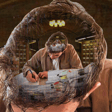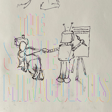Become a Creator today!Start creating today - Share your story with the world!
Start for free
00:00:00
00:00:01

1 . Science God Sex Art Magic
Introducing The Sane & Miraculous!
Host Robbie Carlton gives an overview of the territory we’ll be exploring in this podcast.
- The God Shaped Hole in Modernity
- Explaining mind & Enchanted mind
- Three (count them!) of Ken Wilbers’s variations on the theme
- The land the road of integration (likely) takes us through
- And a dainty brush with
- Sex
- Art
- and Magic
Transcript
Introduction: The 'God-Shaped Hole'
00:00:00
Speaker
Steal yourself. This is going to be a lot. I'm gonna stop by reading you something. There is a god-shaped hole in the modern worldview. The modern mind reasonably has a hard time swallowing the millennia-old myths that are the fare of much mainstream religion. Those ancient myths answered a number of questions. How does the world work? Why do things happen? Where did the world come from?
00:00:29
Speaker
But then modernity developed a tool which gave much better, clearer, more useful answers to many of those questions. Science.
Science and Existential Questions
00:00:40
Speaker
But there are some other questions those ancient myths served. Questions of the good, of purpose, of ultimate meaning, of the ground of being, of our place within the unfolding world around us.
00:00:57
Speaker
These questions are not well answered by modernity's big answer. Science is simply not a good tool for that kind of question. In the absence of the gods, we found other things to fulfill this function. Things which are also not well suited to them and become distorted in the process. Science becomes scientism. Politics becomes extremism. Self-improvement becomes narcissism.
00:01:27
Speaker
Participating in a community becomes joining cults. Taking care of material needs becomes consumerism, and philosophy becomes nihilism. But many of us intuit
Modern Understanding and Vaster Reality
00:01:41
Speaker
that there is something more to the world than the lifeless mechanics of particles banging into particles. That the whole in our modern worldview can be contacted by something else.
00:01:55
Speaker
call it God, the divine, the sacred, the numinous, the miraculous. Through some unique personal mix of direct experience, intellectual analysis, and intuition, we recognize that there is something more, and we're looking for ways to integrate our modern understanding of the world with this vaster reality.
00:02:20
Speaker
And what's more, we can see that integrating this vast reality provides enormous benefit, not just for an intellectual understanding of human life in the world, but in the extremely practical, intimate, and messy details of our day-to-day lives, our relationships, our search for purpose, our search for healing, and our search to live beautiful, fulfilling lives.
00:02:50
Speaker
Now, I start that out talking about God.
Exploring Explaining vs. Enchanted Minds
00:02:53
Speaker
That's like the most inflammatory word you could use for that side of this kind of this polarity. But sometimes it's fun to use the most inflammatory word you can. So this first episode is going to be laying out the program for this podcast.
00:03:11
Speaker
And as such, I'm going to touch on a lot of different things, bring in a bunch of different ideas, which I'm not going to go as deeply into as I would like. And I'm going to have to be disciplined here. My, my inclination is going to be to go off on extensive tangents, which I'm not going to do. I'm just going to lay out the broad strokes of the program. What are we doing here? What is this podcast about? At least to begin with, like, what is our starting out point?
00:03:40
Speaker
And so the little piece I just read you is one way of framing this starting out point. And here's another way. But we can think about there being two aspects of being, not the only two, but there are two aspects of being. One, I'm going to call the explaining mind.
00:04:04
Speaker
So the explaining mind is the mind that seeks explanation and creates explanation. It's the mind that wants to understand how something works and wants to understand how it works in terms of cause and effect. It wants things to be logical, rational, explicable, right? The explaining mind. Another aspect of being is the enchanted mind.
00:04:33
Speaker
I hate problem with the enchanted mind is it doesn't want to be named. And so as soon as you give it a name like 10,000 counter examples erupt. But just for this conversation right now, I'm going to call it the enchanted mind. So the enchanted mind is the is
00:04:55
Speaker
the mind that experiences life as mysterious, as wondrous, as magical. Instead of the world being a network of causes and effects, each thing is its own cause. And the enchanted mind neither wants nor is satisfied by any explanation.
00:05:19
Speaker
So these two minds are often in a lot of tension. You can almost see it, like the explaining mind is trying to disenchant the world and the enchanted mind is averse to that, doesn't want the world to be disenchanted because it's part of the enchantment. And so these two things are often in tension and it's a polarity.
00:05:48
Speaker
And when we have a polarity that is in such strong tension, it is easy and natural to collapse down to one pole or the other. So a lot of people collapse down to one pole or the other. A lot of traditions collapse down to one pole or the other. A lot of institutions collapse down to one pole or the other.
Integrating Mindsets
00:06:14
Speaker
When somebody collapses down to the pole of the explaining mind, they say, I don't buy any of this woo-woo, floofy nonsense. Don't tell me about tarot cards. Don't tell me about astrology. I'm a hard man of science and I believe in what science can tell me and I believe in the product of the rational mind
00:06:40
Speaker
Get away from me with your, your ill-defined psychologically transparent attempts at self-deception. And then the enchanted mind, the enchanted mind says,
00:06:53
Speaker
Hey, whatever makes me feel good, whatever makes me feel alive, whatever makes me feel turned on, whatever makes me light up. That's what I'm gonna follow and pay attention to. I don't care if I'm right or wrong. I don't care if there's self-deception or not. I don't even care what the ultimate consequences are. Cause and effect is not relevant to me. I'm just gonna, just gonna go with the flow.
00:07:17
Speaker
So we have these two poles that are in a lot of tension and this inclination to collapse down to one pole or the other. The purpose of this project, this podcast and the things around this podcast is to ask the question, how do we integrate those two poles? How do we live?
00:07:42
Speaker
with both truths, recognizing the beauty, the wisdom, and the power of both of those aspects of being, not collapsing down to one at the expense of the other. So things we're going to touch on in this episode, we're going to talk about, we're going to steel man those two perspectives. We're going to go into more detail about the two dimensions, two perspectives.
00:08:11
Speaker
We're going to talk about some existing ideas. There are some ideas that already attempt this integration in various ways.
Ken Wilber's Integrative Philosophy
00:08:21
Speaker
And I'm going to talk about those and I'm also going to talk about some of the limitations that I'm going to tentatively propose. Not exactly a new idea about how to integrate the two, but maybe a field of
00:08:39
Speaker
Like a good place I think to look, I think the best place to look. And I'm also going to briefly touch on some of the other areas that this podcast will, uh, we'll play in. Okay. So let's begin. Let's steal man. These two perspectives.
00:08:55
Speaker
We're kinda gonna do both. We're gonna steal, so if you don't know a steel man, this is a great idea. It's the kind of opposite of a straw man. So a straw man, I almost did a straw man when I did the I'm a hard man of science and why I'm just a floofy, you know, go with the flow, right? That's kind of the straw man of those two perspectives. The idea of a straw man is you're kind of giving like, not a good defense of a perspective. You're just saying, here's some
00:09:18
Speaker
Stupid argument that somebody else is making right? This is that's what a straw man is you describe somebody else's argument in an not a generous way and Make it look bad Steel manning is the opposite so when you steal man an argument what it means is you're presenting the argument as strongly as you can Even if you don't agree with it specifically if you don't if you agree with it, that's just making an argument and
00:09:43
Speaker
So we're kind of going to take both of these perspectives and we're going to give them their due. But we're also going to talk about the failings. So the explaining mind, and also another word for the explaining mind, because let's just have 10,000 words for everything. Another way of thinking about the explaining mind is to talk about modern metaphysics. And I kind of touched on that in the first piece with God-shaped whole and then modernity. There's like a whole historical story you can tell about it, which is pretty compelling.
00:10:12
Speaker
about this advent of modern metaphysics. Metaphysics is the philosophy of the nature of reality. Galileo comes along, Newton comes along, Descartes comes along, and a bunch of other people, of course, construct this
00:10:35
Speaker
New metaphysics of modernity we're not doing a book a historical story about this but there is a big historical story about it super interesting but maybe I know later podcast will go more into the details of that but that's just another way of thinking about it so modern metaphysics the explaining mind. So the strengths strengths are really easy to talk about.
00:10:54
Speaker
They're really obvious. It's, it's brilliant. This, this mind, it's brilliant. It, it looks at the world and it's found a way to penetrate beyond these kinds of this dense cloud of self diluting cognitive biases that human beings have because we
00:11:23
Speaker
evolved to exist in this very specific context geographically, ecologically, with a very limited set of, you know, a very limited set of concerns of like finding food, avoiding danger, finding shelter, finding a mate, like very, very simple, kind of confined, not simple, a very limited, confined kind of world that our minds developed to deal with.
00:11:54
Speaker
And then the fact that we've been able to turn our minds out into the vast universe and make so much sense of it, make so much sense of it, make so much sense of what's going on
00:12:08
Speaker
10 million, million miles away and so much sense of what's going on at the heart of the sun and so much sense of what was going on 13 billion years ago, what was even going on 100,000 years ago, so much sense of what's going on in the tiniest little bits of matter that make up our reality. We've somehow managed to move past this kind of
00:12:37
Speaker
the limitations of our minds. Using this very specific, it's a metaphysics, but it's also a set of tools. And the whole suite, which is the explaining mind, it's phenomenal, right?
00:12:53
Speaker
We have so many benefits from it today, right? Like the fact that I am communicating with you, somebody I don't even necessarily know, maybe we've never met personally, and you're hearing my voice is a miracle. That is, it's magic, literally.
00:13:13
Speaker
150 years ago, that's magic. And science has produced this. The explaining mind has produced this. People kind of get in fights about this, like, oh, well, it's all just made things worse. It hasn't. It's mostly made things better. It's made some things worse. And this such a thing is too much of a good thing. But it's a good thing, which we are now having a bit too much of. That is a conversation for another day. But, but, you know, if nothing else, cancer treatments for children.
00:13:41
Speaker
Like, it's very hard to argue with the fact that we can not all the time, but sometimes treat the cancer of, you know, five-year-old, eight-year-old children. That's a good thing. And that's a thing that comes from the explaining mind. The explaining mind is the thing that lets us understand the mechanics of basic reality in such a way that we can produce these wondrous results.
00:14:11
Speaker
We haven't found anything nearly as effective for producing truth and understanding. But the explaining mind untempered limits the imagination. It says, now that we have this mode of explanation, all things must be explained in this way.
00:14:36
Speaker
and questions that cannot be answered by this method are not real questions. It kills God. That's what Nietzsche said. I think Nietzsche was maybe a little more sympathetic to the explaining mind, but he also saw the problem that it kills God. Notice that it's a really interesting move that the explaining mind does.
00:15:03
Speaker
It says, if something cannot be explained to my satisfaction as the explaining mind, then it's a false question. That's one of the tricky things about the explaining mind is that rejection of things that it cannot address.
00:15:25
Speaker
rather than saying, okay, that's not my domain. I mean, and I'm not talking about like an individual scientist, right? An individual scientist might very well say, that's not my domain. You know, questions of meaning, it's not my domain. Talk to your priest, talk to your rabbi, talk to your spiritual leader, talk to your therapist, whatever. That would be a relatively integrated person of science.
00:15:54
Speaker
But the explaining mind itself doesn't make that distinction. The explaining mind says, it's not in my domain, it's not real. The people who collapse into this extreme tend to be clear, rational, sensible, and lifeless, nihilistic, and depressed.
00:16:17
Speaker
Let's talk about the enchanted mind. I might say magical metaphysics in contrast with modern metaphysics. Magical metaphysics are good because they maintain a broadness of view. They don't have that reduction. They have a broadness of view. They maintain an enchantment.
00:16:38
Speaker
They restore meaning to the world and allow us to live in a way that is hopeful, optimistic, peaceful, and connected with the world. They recognize the intrinsic goodness and intelligence of reality. But untempered, magical metaphysics is weak. It's prone to cognitive bias, especially confirmation bias.
00:17:05
Speaker
It leads people down feedback chambers of self-fulfilling worldviews, conspiracy theories, and quackism. It's hard to distinguish between the instinctive and the intuitive. The intuitive leads you well
00:17:24
Speaker
while the instinctive just has you follow your habitual patenting for good or ill. This untempered magical metaphysics is why a segment of the New Age movement went completely off the rails of the beginning of COVID. Why there is a contingent of New Ages who are pro-Trump, QAnon adherents who believe Bill Gates is implanting microchips in people with the COVID vaccine.
00:17:51
Speaker
Just throw a bunch of politics at you there. Watch out. But yeah, all that stuff is crazy nonsense. So if you don't think that stuff is crazy nonsense, I hope you stick around and we get to keep hanging out. But just know that stuff is crazy nonsense. The people who collapse into this extreme are magical, charismatic, beautiful, and holy.
00:18:13
Speaker
But they're not sane, they're not grounded, and they're not clear. They're artists, ecstatic, and addict. Okay, so now let's talk about some of the ways that we can integrate these two. Some of the kind of approaches that are already out there.
00:18:37
Speaker
So someone that has been incredibly influential for me in beginning this process of integration is a philosopher called Ken Wilber. You may or may not be familiar with Ken Wilber, but his name will come up a lot. Ken Wilber's philosophy is a lot going on. Well, I'm sure we'll talk about it in this podcast in greater detail, but he has a few different places in his map
00:19:04
Speaker
that are useful distinctions that begin to allow the integration of these things.
Understanding Reality's Dual Nature
00:19:14
Speaker
So the first we're going to talk about is the interior and exterior distinction.
00:19:19
Speaker
So one of the things Ken does is he breaks reality into four quadrants. I'm going to talk about all the quadrants. I'm going to talk about two of them. There are two halves. So two pairs of quadrants, the interior and the exterior. And what he points out is that everything that arises has an expression in the exterior and an expression in the interior.
00:19:50
Speaker
So my brain is the exterior expression of the same arising as my mind is the interior expression. Now the explaining mind wants to say the brain is the real thing and the mind
00:20:13
Speaker
is this kind of consequence of the brain, this epiphenomenological or somehow caused by the brain.
00:20:25
Speaker
This is a little bit different. This is saying there is an arising which has both an exterior and an interior component that colorize. A great canism is, because there are really four quadrants, so one of the things Ken says is, every occasion tetra arises in all four quadrants. It's kind of ridiculous, Ken thinks they, but the thing which we sometimes call my brain and sometimes call my mind,
00:20:52
Speaker
Is a thing which co arises both in the interiority in the subjectivity of my experience and in the exteriority the objectivity of my physical brain. So if you do that you can kind of that's one way of breaking down. Saying well the explaining mind.
00:21:12
Speaker
deals with the exteriors, deals with the objective, it deals with what's called the right-hand quadrants, the exterior quadrants, while the enchanted mind deals with the interiors, the interior quadrants. So that's one way of starting to make sense, of integrating these things.
00:21:35
Speaker
Another, also from CAN. So all three of these are from CAN. I'm going to give you three CAN ideas. And then I'm going to talk about kind of some of their brilliance. And while we're talking about their brilliance now, I'm going to talk about some limitations. So another related idea is the idea of the relative and the absolute. This isn't just CAN. A lot of people talk about this. Eckhart Tolle talks about this. This is the first place I heard this. So the relative and the absolute. So the idea here is that there's the relative world
00:22:04
Speaker
Forms arising i guess this is a buddhist idea at heart but the the relative world of forms arising. Crashing into each other having you know the.
00:22:20
Speaker
following the laws of physics, following the laws of cause and effect. There's a line in a Trungpa translation of the Four Great Reminders I think it's called. He says, the laws of cause and effect cannot be escaped. So that is in the relative. And then contrasting that is the absolute. So the absolute is the kind of unnamable, undescribable reality
00:22:51
Speaker
that's just everything, everything. And it's kind of hard to talk about because as soon as you start talking, you're kind of in the realm of the relative. One of the things, you know, there's a thousand pointers to this, you know, when people talk about a non-jewel tradition, the absolute is kind of
00:23:18
Speaker
an aspect of a non-dual tradition. It's very difficult to talk about. One great kind of pointing out instruction for the absolute is Alan Watts talking about, you know, he says this a few different ways. He says, in exactly the same way that a wave is something the whole ocean is doing.
00:23:45
Speaker
You are something the whole universe is doing. And another way of talking about that is to say you are inseparable from the Big Bang. There wasn't something that happened a long time ago, and now there's you distinct from that. There is just the happening.
00:24:15
Speaker
and you are an aspect of the happening. So, you know, this is getting into the absolute a little bit. Again, hard to talk about. So when we talk about the relative and the absolute, this is another way, like the enchanted mind, the explaining mind is interested in the relative and in the mechanics of the relative. And the enchanted mind is interested in the absolute.
00:24:42
Speaker
Now, that one is less satisfying. I'm going to get into why. But one more Ken contribution, which is really, this is just absolutely brilliant. Super useful in like a thousand different applications. So one of the things Ken looks at a lot is stages of development. And there's a patent. The patent comes from Hegel. So the patent is the patent of thesis, antithesis, or antithesis, and synthesis.
00:25:08
Speaker
which is synthesis, I suppose that I was kind of awkward to say. So this pattern is you have some idea and then you have the contradiction to that idea and then finally you have an integration. So in a way this whole podcast could be looked at as there was an idea of gods and then there was a contradiction to the idea that there are no gods.
00:25:37
Speaker
So the thesis, the world is inhabited, the world is enchanted, antithesis, no, the world is a machine that's completely understandable. And then what's the synthesis? So that's the question here. That's the project here. Ken looks at that question through stages of development, psychological and cultural. Just talk about psychological.
00:26:02
Speaker
for now, and he has colors like a lot of terminology and stuff, but the basic idea is you have the pre-rational
00:26:12
Speaker
Which is, you know, all of this stuff before modern metaphysics becomes embodied. So a child is pre-rational. A child, you know, thinks that the moon is following them. A child kind of has this magical worldview, thinks that, you know, if you step on the crack, you break your mother's back, right? Like, even if they don't really believe it, but there's something there. But children have this magical worldview. And then at some point you develop
00:26:39
Speaker
the modern rational world view. And a lot of our education is about getting you there. And so then you're at the rational stage. So you have the pre-rational stage and then you have the rational stage. And then you have later, you move beyond the rational stage.
00:26:58
Speaker
Some point you run into the limitations of the rational stage. You start to see the ways that by itself, that rational stage of development is limited and that there are more useful, more beautiful, more true perspectives available, more inclusive. And so you move out of the rational stage into the trans rational stage.
00:27:27
Speaker
And so that's another very explicit way that Ken talks about this stuff. So you see how clearly it maps onto this project. One of the brilliant things that Ken talks about here is this idea of a pre-trans fallacy.
Pre-Rational vs. Trans-Rational Beliefs
00:27:43
Speaker
So you have pre-rational, you have rational, and then you have trans-rational. So a pre-trans fallacy is one of two kinds of fallacies. It's any time that you are mistaking something trans-rational for something pre-rational or you are mistaking something pre-rational for something trans-rational.
00:28:08
Speaker
So an example of each kind of pre-trans fallacy, so a pre-trans fallacy in the direction of, let's call this a trans fallacy. So a trans fallacy would be where I look at a pre-rational belief and decide that it is a trans-rational belief. So something like the world is run by lizard people.
00:28:36
Speaker
That is a kind of pre-rational, weird, paranoid, magical belief that if I'm holding it and I believe that I am a rational person, and then I'm like, but you know, there's this mainstream narrative, but beyond the mainstream narrative, the lizard people are real. That is a trans fallacy.
00:28:59
Speaker
that a pre-falsy would be to say any kind of spiritual experience, any kind of mystical experience, that's just brain chemistry. That's just a childish self-delusion, self-deception or wish fulfillment.
00:29:19
Speaker
So that would be a pre fallacy. So those are the pre trans fallacies. Um, I don't think Ken, I think Ken calls both of those pre trans fallacies, but it's worth having different things. So it's worth having different names. Um, he gives these examples of Freud and young. I'm not going to go into that, but Freud would did the pre fallacy and young did the trans fallacy, right? They would, that's kind of the ways that they went.
00:29:42
Speaker
This is another map. So his three maps of Ken's. So, and as I'm talking about this, I feel my soul trying out. I love Ken. He was so helpful to me. People talk about him as being heady and kind of, you know, cold and kind of dance. And I experienced his work as being filled with love, actually.
00:30:06
Speaker
I love of like all of the perspectives and I'm sure I'm going to talk more about Ken's work. I also find it limiting. One of the ways that I find it limiting, um, it's, it's, it's the explaining mind looking at enchantment.
00:30:29
Speaker
And so this is what's so tricky. And it's so, as I'm talking about this, you know, giving all of these distinctions, like, yeah, I feel my soul drying out a little bit. And I'm like, I, I'm missing the enchantment of the enchantment. And I think it's really helpful. What Ken's work is really helpful for is it is an exit. It's an off ramp out of the, the limitations of the explaining mind.
00:30:56
Speaker
But I don't, for me, it doesn't have the whole picture of the integration. And so it's like enchantment also lives in the dark. This is turning the lights on.
00:31:16
Speaker
an enchantment kind of a little bit flees from the light. You know, for the same reason you don't typically make love with like bright neon lights on, right? And I think one of the reasons why pornography is aesthetically unpleasant, like holding aside the ethical and moral dimensions of it, but why it's typical pornography is
00:31:46
Speaker
aesthetically offensive is because the lights are on too bright, and it scares away the enchantment, and that is a domain which otherwise can have a lot of the sacred in it and a lot of enchantment in it. Temples and churches, they're illuminated, but they're also dark.
00:32:10
Speaker
and you sit in the relative darkness when you pray, also when you grow mushrooms, mushrooms grow in the dark. And so this is some of the difficulty of just talking about any of this stuff, is how do you talk about it while maintaining the enchantment? And I think that purely viewing the enchanted mind through the lens of the explaining mind,
00:32:38
Speaker
is not enough. It's important, but we also have to learn to directly inhabit the enchanted mind. I'm not saying that Ken would disagree with this, but just that the project by itself is incomplete. So I'm going to talk briefly more about the explaining mind as a segue into earlier I said I'm going to present my sense of the field
00:33:06
Speaker
that is going to be most fruitful to explore the field or the area. It's not a particular discipline, but the area that's gonna be most fruitful to explore in this question, at least it has been for me recently. So I'm gonna lead into that with a little bit more about the explaining mind. So the explaining mind would just be a useful tool, right? It was originally developed as a tool
00:33:36
Speaker
And it's a very useful tool. There's a combination of two factors that too often turn this tool into a dangerous trap. Number one, it's very usefulness is part of what makes it a trap.
00:33:53
Speaker
It's really good at some things and it can produce a lot of results that we like. I talked about this earlier, medicine, science, technology. We've been to the moon. We've been to the moon. You know, I'm talking to you across time and space.
00:34:10
Speaker
You know, sat in front of this unbelievable machine that does all these things for us. So all of that wax poetic about the fruits of the explaining mind, it's so useful that it's seductive. We start to say, well, I want that level of efficacy in all domains. And then the second thing that makes it a dangerous trap, it's a way of thinking that does not come naturally.
00:34:40
Speaker
It doesn't come naturally to us at all. It's very unnatural in some way. It's very disciplined and artificial. To exploit its usefulness requires a lot of discipline over a long time. It's a little bit obscured for most of us this because
00:34:59
Speaker
This is what we do through a big part of our formal education, especially, well, the whole thing, but especially, you know, as children and as teenagers, modern education is dedicated to disciplining us in this unnatural way, to disciplining our minds, to operate in this unnatural way, which is so fruitful. So this combination of things, it has this unnoticed side effect
00:35:26
Speaker
which is that our imagination becomes bound to this way of looking. Because we want it so much for good reason, we want this tool so much, because it requires so much discipline to train the mind to see the world in this way, the mind becomes bound
00:35:45
Speaker
You know in exactly the same way that if you sit in the same posture in the same seat in the same desk hours and hours and hours every day your body becomes bound.
00:35:57
Speaker
to that shape and it becomes limited in taking other shapes. So our mind has become bound into this one way of looking. And then once it's bound like that, the only things we can see are explainable things.
00:36:17
Speaker
the explaining mind can only see explainable things. If we're using the explaining mind like a tool that we bring in and out when needed, then we can still see everything else, many other things. But if we are bound to the explaining mind and we not only bring it in as a tool, but we use it as the
00:36:42
Speaker
the view through which we look, then all we can see are explainable things. And everything else is rejected as either unimportant or not well formulated. It's a wrong question. This is a great phrase from Eliezer Jutkowski, who's a prominent rationalist. He talks about wrong questions.
00:37:07
Speaker
So what we want, instead of being bound to the explaining line, we want to have access to it as part of a range of tools and worldview views. It's a very particular tool and it's a very powerful tool. Maybe, I think it would be fair to say it's the single most powerful, perspectival tool we have.
00:37:26
Speaker
And I think it does make sense for us to use it often, more often than many other tools. Think about a computer. For many of us at this point, some kind of computer is the single most useful tool in our lives. We use computers all the time, every day, to do a host of incredible things, sending words, sounds, and images to other people at the speed of light, causing objects to be brought by strangers from anywhere in the world to our doorstep in a matter of days.
00:37:52
Speaker
and, incidentally, causing certain numbers in the databases of our banks to go down, creating art in a suspended form of ultimate plasticity, where we can make infinite copies, tweak and play to a heart's content, go back to previous incarnations.
00:38:08
Speaker
you know, and endless, whatever you do with computers, you know what it is, right? It's an incredibly useful tool. But if someone said, we should just use the computer as our only tool, it's so powerful, we don't really need any other tool. Anytime you need a tool for something, just use your computer, okay? So then clipping your nails, mowing the lawn.
00:38:29
Speaker
streaming past it, making a hole in the wall so you can hang a painting. Like, you know, some of those you might just about maybe making the hole you could use a computer for. But it's obvious, right? Like, we don't wanna be constrained to this tool. And because the tool of the explaining mind, it's not only a tool, but it is a way of looking.
00:38:55
Speaker
It's that much more restrictive when we are constrained to it. So I've been saying we are constrained and I dropped the word, but really our imagination is constrained.
Re-Enchanting the World with Imagination
00:39:10
Speaker
So this is the area that I think is going to be really fruitful for this inquiry, is the domain of imagination. And I think we have suffered a great failure of imagination and that everything I've talked about today can be seen as a failure of imagination or more specifically, a construction of imagination.
00:39:39
Speaker
It is a necessary constriction to learn the tool of the explaining mind. To learn the worldview of modern metaphysics is necessary for a period to constrain your imagination. But that constriction disenchants the world and it disenchants ourselves. Religion and spirituality are exercises of the imagination.
00:40:06
Speaker
But careful how you hear that. When I say that, it's easy to imagine that is a dismissal. Religion is an exercise of the imagination. That is a dismissal. The spiritual practices is developing your imagination. Somehow, I'm saying it's not real. But that is part of the problem. That that's what our ears do with the word imagination.
00:40:37
Speaker
They hear it as a dismissal, but I'm not trying to dismiss imagination, I'm trying to elevate it. In constricting the bulk of our imagination to an understanding of reality, we have ossified it. Our commitment to sanity, to a reality which is predictable and consensus, has rendered our imagination impotent. We stop experiencing it as imagination in here and start experiencing it as reality out there.
00:41:07
Speaker
And then with what little bit of imagination that is not being constrained in this way, we entertain ourselves, we daydream, we create the outcomes of our lives. And then we think imagination is weak, useless, childish, and unimportant. It's relegated. It's disregarded. But imagination is creating the whole world.
00:41:32
Speaker
your experience of the world is completely conditioned by your imagination of what's happening. And so to reclaim your imagination from the constriction of modern metaphysics is to reclaim a power that is yours, that's precious and powerful, that you have been craving maybe for decades, feeling the lack of, and then trying to fill with something else.
00:42:00
Speaker
When we move the enchantment out of ourselves, we crave. We feel that something is missing, that something important is lost, and then we try and fill the hole. Remember at the beginning, this list of isms, consumerism, nihilism, cults, scientism, extremism, political extremism, so we try and fill the hole that is the absence of our own enchantment.
00:42:29
Speaker
When we can re-enchant ourselves, we re-enchant the world, we re-enchant life, and there is a deep satisfaction. I'm gonna bring in a new word now. I'm gonna bring in the word magic and the work of the magician. I think this is the work of the magician, is the re-enchantment of the self and the re-enchantment of the world. Okay, so I titled this episode,
00:42:56
Speaker
Science, God, sex, art, and magic. And so I gotta give you sex, I've talked about science and God, so we gotta do sex, art, and magic for a second. Polly was just, I wanted a titillating title. But it's also, I'm not gonna go into great detail about this now, but sex is in here. And Polly, that's to do with my own path and my own experience of re-enchantment and where that comes from.
00:43:26
Speaker
And it's partly, I think, because it is a dimension of being and a dimension of imagination, which is deeply enshadowed in our culture. And so a lot of really interesting, rich and unexplored stuff has gone and kind of hidden out in the domain of the sexual.
00:43:50
Speaker
So part of what this podcast is going to include is shining a light in that direction. But like it has to be, like I said before, you don't want like a led lights. You don't want like fluorescent bulbs. You want like a, you know, a lamp.
00:44:08
Speaker
Just leaving a lamp over in that in shadowed realm and just to be able to start to invite out some of that a little more into integration. There's a lot more to say about sex, but that's what I'm going to say today. And then art.
00:44:31
Speaker
I guess this is kind of obvious. I don't want an answer to my question because I just started this project. So there's a way I'm like, what's interesting to me is, is the question, right? The question, the problem, like, how do we integrate these things? I don't think there's going to be one really neat, simple answer. That's like, Oh, well, the answer is blah, blah, blah, blah, blah.
00:44:51
Speaker
And now it's answered, right? Ken has all these beautiful answers I just talked about. I was hanging out with his answers for literally a decade going like, okay, I think this kind of does it. But I was ultimately not satisfied. I don't think there's supposed to be an answer. And I think that the question and the conversation, finding the ways that people are working with this is infinitely more interesting than coming to an answer. But saying that, if there is an answer, it's probably just art.
00:45:19
Speaker
I was talking about imagination. What is art? Art is the sport of the imagination. Art is the activity of enchantment in human life. I think it's the original practice. When someone makes art, they are taking the shape of God, and it's a vehicle of enchantment.
00:45:42
Speaker
And so I'm going to be talking about art and I'm going to be talking with artists and I'm going to be talking about artistic process and the practice of art because I find it fascinating. I think it's deeply important. I think it's deeply central to this exploration. And then I use this word magic and I really don't want to talk about magic. Let me see. I wrote something down.
00:46:13
Speaker
All right, I'm just gonna read what I wrote. The reason, let me just talk about the next episode you're gonna hear me talking with Brooke McNamara, which I already recorded. And we talk about explaining the joke in that magic is the dimension of being that really doesn't want to explain the joke. And it's very allergic to being talked about. And I'm feeling that now, but I'm going to just say what I wrote.
00:46:43
Speaker
And it's just a little bit and it doesn't come close to scratching the surface or touching it, but that's why there's a whole project. Magic is the encompassing frame. Spirit says, everything is one substance. Everything is one. Magic says, yeah, well, you know, that's just like your opinion, man. Magic says, everything is possible.
00:47:15
Speaker
Magic says, do what thou wilt. Weird history with that one, but do what thou wilt. Magic says, don't seek understanding. Understanding is a wild goose. Understanding is a red herring. Understanding is the booby prize. Understanding and two dollars will get you a cup of coffee. Not anymore. Understanding and six dollars will get you a cup of coffee.
00:47:43
Speaker
Magic says, flee from understanding, seek enchantment. So that's some of the terrain of the scope of the project. I want to revisit a little bit. Right at the beginning, I talked about some of the problems of the world. And there's this novellous quote, where there are no gods, demons will hold sway.
00:48:12
Speaker
And I'm not really someone that's into the kind of doomsday like, oh my god, the world is fucked and we need to save it. It doesn't totally resonate with me. But I do think that a lot of bad problems that exist today
00:48:30
Speaker
have at their root this disconnection from enchantment and then another set of bad problems have as their root a disconnection from the explaining mind so I do think that there's something
00:48:48
Speaker
This isn't kind of purely a philosophical exercise. I think that it has a very, very practical consequences to be thinking about these questions and working with these questions. So I just I want to bring that in. It's not really
00:49:05
Speaker
What turns me on is to save the world. What turns me on is just to like, that's a long question I guess, but it's not just as, it's not to save the world, but I do think that the world could use some help. And I think that this is one avenue that help can, from which help can come.
00:49:24
Speaker
Okay, just a couple of last things to say.
Conclusion: Engaging Perspectives and Community
00:49:27
Speaker
So one is just to talk about how am I slash we going to work on this project, achieve this goal, solve this problem. Now, like I said, I don't know if a solution is really the thing as much as a manifesting of interest in the question.
00:49:45
Speaker
um if that's not a completely ridiculous thing to say although i think i've said several other completely ridiculous things already in this recording so i don't know i'm worried about that now you know we're just trying to enliven the question how about that and so a few ways that i'm going to be doing that
00:50:02
Speaker
One is this kind of thing where I'm going to be just kind of exploring some of my own thinking about these questions. Another is going into more detail about specific people's work. I'm sure I'm going to go into detail about Ken's work and this bunch of other people working on stuff, which I'll be kind of examining and integrating thinking about. Also, a lot of this podcast is going to be me talking to people who are doing
00:50:26
Speaker
work that is either directly on this kind of area or adjacent enough to it that it feels relevant to bring it into the conversation and then another piece is gonna be creating community so there is gonna be a patreon it's not up yet but it's gonna be up soon where we can actually have like a more of an interactive conversation between people who.
00:50:48
Speaker
are particularly excited about this question and this conversation, so look out for that soon. But that's definitely, I want to include the people that are interested in this question, meaning you in the conversation. P.S. There's a bonus prize for the first person to email me.
00:51:06
Speaker
giving me the exact count of the number of times that I said conversation in this recording, including that time just then. Email me robby at partofliance.com. So all that's left to say is thank you so much for your time and attention today. I really appreciate you hanging out with me. And I hope you got something interesting, provocative, inspiring out of this and that you will come back and hang out with me again. I am your host, Robbie Carlton, and this is The Scene in Miraculous.











